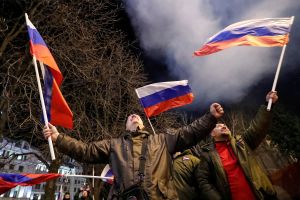A new Chicago Council-Levada poll reveals the Russian public appears to be buying Putin's explanation for "military operation" in Ukraine.
While the whole world seems to be watching the Russian "special military operation" in Ukraine, a new joint survey by the Chicago Council on Global Affairs and the Levada Center conducted March 24–30 shows that most people living in Russia are not following these events closely. Nevertheless, a majority of Russians say they support their country’s military action—with just over half strongly backing it. For the most part, Russians think these actions are being taken to protect and defend fellow Russians and Russian speakers in Ukraine, to protect Russia itself, or to "denazify" Ukraine—storylines that have been amplified by the Russian government’s media apparatus. But as the conflict drags on, it may become more difficult to sustain this support, especially as the casualty rates are uncovered and the economic repercussions of the Western sanctions begin to more seriously affect Russian households.
Key Findings
- A majority of Russians strongly (53%) or somewhat (28%) support their country’s military operation in Ukraine.
- Few who support the military action believe it is motivated by Russia’s desire to annex Ukraine and/or the Donbas region.
- Those who rely on internet sites, social media, or family/friends for information are roughly 15 percentage points less likely to strongly support the military operation than those who get their news from television, radio, or newspapers.
- While there have been significant protests in Russia against the military action, most Russians are not closely following them.
Because of the Russian government restrictions on the use of certain terms to describe the Russian military action in Ukraine, the joint survey used either "military operation" or "military action" in these questions. To be true to the results, we use that language throughout this report.
President Putin has repeatedly claimed "denazification" as a motive behind the military operation in Ukraine. He has compared Ukrainian elected officials to the Nazi regime, claiming that they oppress, and are even committing genocide against, the ethnic Russian population in Ukraine. This survey used the terms “denazify” and “denazification” because they are prevalent in Russian government and media discourse surrounding the operation in Ukraine.










